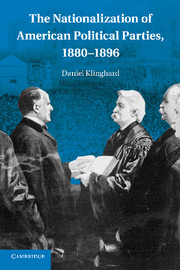Book contents
- Frontmatter
- Contents
- Preface
- Acknowledgments
- Introduction
- 1 Localism and the Jacksonian Mode
- 2 The Nineteenth-Century Associational Explosion and the Challenge to the Jacksonian Mode
- 3 Organizational Transformation and the National Parties
- 4 National Campaign Clubs and the Party-in-the-Electorate
- 5 Grover Cleveland and the Emergence of Presidential Party Leadership
- 6 Party Transformation in the Republican Party
- Conclusion
- Selected Bibliography
- Index
- References
3 - Organizational Transformation and the National Parties
Published online by Cambridge University Press: 06 July 2010
- Frontmatter
- Contents
- Preface
- Acknowledgments
- Introduction
- 1 Localism and the Jacksonian Mode
- 2 The Nineteenth-Century Associational Explosion and the Challenge to the Jacksonian Mode
- 3 Organizational Transformation and the National Parties
- 4 National Campaign Clubs and the Party-in-the-Electorate
- 5 Grover Cleveland and the Emergence of Presidential Party Leadership
- 6 Party Transformation in the Republican Party
- Conclusion
- Selected Bibliography
- Index
- References
Summary
In addition to reshaping Americans' involvement in civic associations, the associational explosion provided a model of national citizen politics that was influential for a critical cadre of national party elites who reoriented national political campaigns in the late nineteenth century. The new campaign style they innovated drew explicitly on the “educational campaign” that was honed in the new associations; it was national in scope (and thus did not rely on local party mobilizers), and it appealed to voters' private self-interest (rather than to their membership in a local partisan community). Although transformative, this new campaign style was insufficient by itself; it required the creation of independent national party organizations, and the Jacksonian mode provided the parties with few organizational tools with which to conduct national campaigns. Beginning in the late nineteenth century, however, national party leaders consolidated control over national campaigns in the national party committees, bolstering their capacities to operate independently of the local party franchises. Republican National Committee Chairman James Clarkson explained that the effect was to “revolutionize” politics “just as dry goods business and all other kinds of business have been revolutionized and conducted on entirely new methods.”
Four changes toward this end are highlighted here and in the rest of the book. First, the parties implemented a new style of campaigning, one that adapted the “educational campaigns” of the associational explosion to party purposes.
- Type
- Chapter
- Information
- The Nationalization of American Political Parties, 1880–1896 , pp. 98 - 123Publisher: Cambridge University PressPrint publication year: 2010

